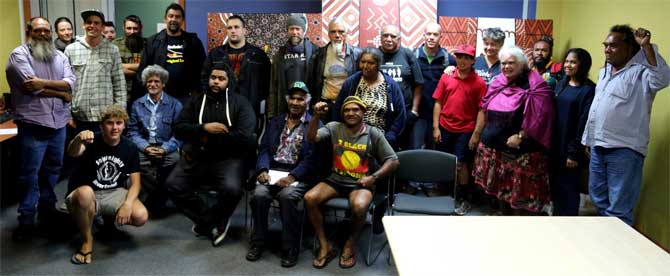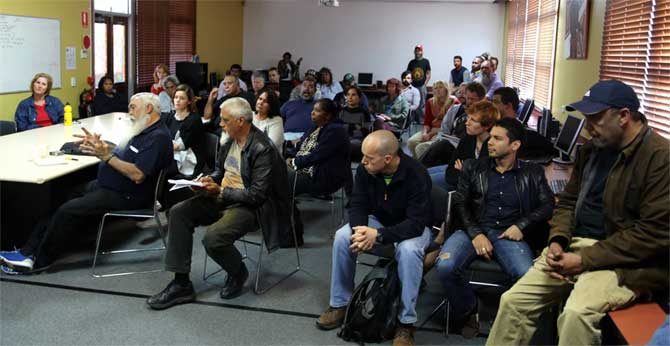Declarations of Independence advanced at Brisbane Treaty Talks
Having attended a two-day Brisbane Treaty Talks conference and workshops on the continuing sovereignty of Aboriginal and Torres Strait Islander Peoples, Michael Anderson said that the meeting was one of the best on a single national issue that he has attended for many years.
"Clearly the people are now asking the pertinent questions relating to a process of asserting their continuing sovereignty as individual Nations," he said.
"They expressed their great admiration for the steps taken by the Murrawarri Republic and are now seeking further advice in relation to the processes that were adopted by the Murrawarri People to take this revolutionary action. The participants agreed unanimously to investigate the processes adopted by the Murrawarri Republic and will now make all efforts to follow the same or similar path."

Sovereign Union Media Release
Brisbane, 20 May 2013
Michael Anderson, Convenor of the Sovereign Union of First Nations and Peoples in Australia, said from Brisbane today:
"Having attended a two-day Brisbane Treaty Talks conference and workshops on the continuing sovereignty of Aboriginal and Torres Strait Islander Peoples, I can say that the meeting was one of the best meetings on a single national issue that I have attended for many years.
"Clearly the people are now asking the pertinent questions relating to a process of asserting their continuing sovereignty as individual Nations.
"They expressed their great admiration for the steps taken by the Murrawarri Republic and are now seeking further advice in relation to the processes that were adopted by the Murrawarri People to take this revolutionary action. The participants agreed unanimously to investigate the processes adopted by the Murrawarri Republic and will now make all efforts to follow the same or similar path.
"The participants of the conference and workshops know in their own hearts that this is what their Elders passed have been seeking to achieve. The people are saying that now they need to make a greater effort to achieve what the Murrawarri have. (For those who were unable to attend, the Treaty Talks were webcast live.)
"A number of considerations that were made will be followed by another meeting in five weeks time, when we will further investigate domestic and legal positions that establish the legal foundation of our own statehood under international.
"Again this meeting will be open to all people considering these actions including non-Aboriginal supporters. The suggested date and venue is to be confirmed:
22nd to 23rd June 2013
Murri School,
1277 Beaudesert Road,
Acacia Ridge, Brisbane
"It must be pointed out, however, that one factor that does, in fact, hold the people back from committing to the sovereignty movement is the question of citizenship rights and the possible ramifications that may flow from it.
"One of the working points that was submitted in discussion was that if post war immigrants are entitled to hold dual citizenship, so too can First Nations people. Dual citizenship permits the immigrants to access all social benefits in Australia and then, in retirement, they can return to their own countries to live, such as Greece and Italy, and there continue to receive their social benefits. Similarly, First Nations people are entitled to dual citizenship within Australia, that is, they can be Anangu, Wokka Wokka, Arabunna etc. and also be Australians at the same time, thereby maintaining the benefits of that dual citizenship status.
"It was pointed out in the workshop that, if Aboriginal people seek to declare their independence within their homelands, then they need to return to Country. Only those who live on Country are in a position make such a Declaration of Independence.
"It is also important to also recognise the rights of their Diaspora, just as the Murrawarri Republic do. That is, people who belong to that Nation, but who choose to live outside of their Country have the same rights as those living on Country, but are not immune from punishment for any offences committed against the Nation’s Law on whose land they are living.
"An example of this is: if you are a Wokka Wokka citizen and you choose to live within the lands of Anangu then you are subject to the Anangu Law, if they have declared independence. If you are on land whose owners have not declared independence, then you are subject to the laws of the originating from Britain.
"The next meeting that has been agreed to by the participants has three main topics:
- The Declarations of Independence themselves, models and processes
- Governance
- Transition times.
"The fundamental social factors, legal jurisdictions and methodologies for implementation fit within a transitional process. The duration of the transitional process is not set, as there is a realisation that people are at different stages in their own understanding. But it was agreed at these Treaty Talks that information kits on sovereignty and independence are developed for circulation. Within this information kit it was requested that a manifesto is created, pointing out all recent and past judgements in the law courts of the former British empire that go to recognising First Nations/Aboriginal Sovereign rights.
"It was pointed out that we must be cautious of the espousing the UN Declaration on the Rights of Indigenous Peoples, as this Declaration requires First Nations Peoples to recognise the territorial integrity of the invader state. Alternatively, the majority of the rights defined in that UN Declaration are already included in UN Covenants and are recognised in international law This includes the right of self-determination, without having to recognise the territorial integrity of the dominant state.
"Another relevant international law, by way of a resolution from the UN General Assembly, is the 1970 Declaration on Friendly Relations that established the principles of equal rights and self-determination of peoples:
Every State has the duty to refrain from forcible action which deprives peoples…of their right to self-determination and freedom and independence. In their actions against, and resistance to, such forcible action in pursuit of the exercise of their right to self-determination, such peoples are entitled to seek and receive support in accordance with the purposes and principles of the Charter.
[Detailed in Principles VII-IX of United Nations General Assembly Resolution 1541]
"We look forward to the next meeting and hope we can see a greater number attend as this is a sovereignty movement that will not be stopped.
"On the question of treaties, the participants agreed that the first step should be that those Aboriginal Nations, who declare independence, should treaty with each other for each other’s recognition and commit to each other to give support, if, or when, necessary in the formation of their state. No doubt future gatherings will locate other matters we each will treaty on.
"In relation to treatying with the Commonwealth Government of Australia, it is not in our interest to treaty with Australia at this point as our people first need to be fully informed about all their rights as sovereign and independent Nations and Peoples."

Convenor,
Sovereign Union of First Nations and Peoples in Australia
0427 292 492 ghillar29@gmail.com
www.sovereignunion.mobi and/or www.nationalunitygovernment.org


